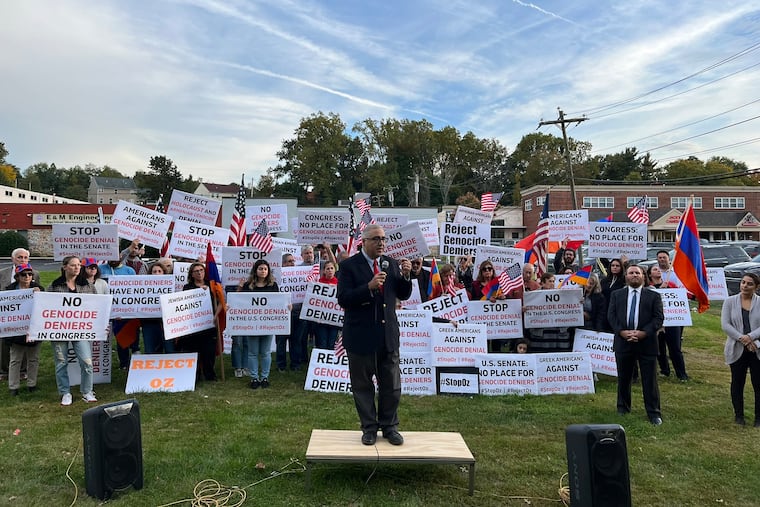Pennsylvania Armenians decry Oz’s failure to recognize the Armenian Genocide
“It’s not just genocide denial, it’s the reason why he’s doing it,” said Lorig Baronian, volunteer for the Armenian National Committee of Pennsylvania.

For Lorig Baronian, the Armenian Genocide is a century-old piece of history that still affects her life today.
The descendant of survivors of the genocide, Baronian grew up hearing about the atrocities her ancestors experienced: her great-grandparents meeting in an orphanage after seeing their entire families killed in front of them; her great-grandmother giving birth to her daughter on a ship while fleeing the genocide; her ancestors fleeing to Palestine, Romania, Lebanon, and eventually the United States for safety.
Thank you for subscribing to our newsletter!
The trauma of the Armenian Genocide carries on through each generation, and for over a century, the Armenian diaspora has been fighting to get the world to recognize the atrocity of the genocide. Now, they’re trying to get Mehmet Oz, Republican nominee for the U.S. Senate, to acknowledge it.
“Genocide denial has no place in the U.S. This should be against our morality and ethics as a nation,” said Baronian, who is a volunteer for the Armenian National Committee of Pennsylvania. “Finally, after 100-plus years, we had both chambers of U.S. Congress and President Biden affirm the reality of this atrocity. And now we have a candidate running for U.S. Senate who can’t even utter the words.”
Members of the Armenian National Committee of America held a demonstration Wednesday protesting Oz for not plainly acknowledging the Armenian Genocide.
Oz’s communications director, Brittany Yanick, said in a statement that Oz “opposes genocide and the murder of innocent people in all forms,” that the “evils of World War I should be commemorated,” and that Oz is looking forward to discussions and “helping the three million people of Armenia today.” Yanick did not say whether Oz recognizes the Armenian Genocide, and he has never been documented acknowledging it.
The Armenian Genocide was carried out by the Ottoman Empire from 1915 to 1917, killing an estimated 1.5 million Armenians and expelling more. To this day, Turkey refuses to acknowledge the genocide. And it wasn’t until last year that the U.S. government formally recognized the genocide under President Joe Biden’s administration.
Dual citizenship concerns
Oz was born in the United States to Turkish immigrants and holds dual citizenship. Some Armenian Americans have hypothesized that Oz’s reluctance to acknowledge the Armenian Genocide stems from his ties to Turkey. Oz has said he will relinquish his Turkish citizenship if he wins the election.
» READ MORE: What we’ve learned from a year of attending Oz and Fetterman campaign events
That has not assuaged some of Oz’s critics.
“I know people that have dual citizenships in other countries, but those people ... don’t have influence over what policies get made, what laws get written where, where our money goes, what path our country is going to take,” said Karine Shamlian, another volunteer with ANCP.
John Fetterman, Oz’s Democratic opponent, released a statement Thursday in support of the Armenian community.
“As a Pennsylvanian, I welcomed the long overdue U.S. government recognition of the Armenian Genocide by the U.S. House and Senate in 2019 and by President Biden in 2021. As a U.S. Senator, I will continue to support promoting public education about this atrocity,” he said. “I support those out protesting Oz’s continued and disgusting silence on this. This is an important issue and Oz’s refusal to acknowledge it is both offensive and damning.”